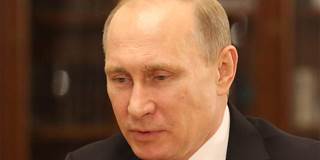In their quest to deepen ties with the EU, Georgia, Moldova, and Ukraine are taking serious risks and enduring considerable hardships. The longer the EU responds to these efforts with indifference and indecision, the faster it will drive its eastern “partners” into Russia’s embrace.
TBILISI – Last week’s EU Eastern Partnership Summit in Riga, Latvia, can be summed up in one word: disappointment. Georgia, Moldova, and Ukraine face considerable hardships – including economic pressure from Russia and the threat of military confrontation – in their quest to deepen their ties to the European Union. And yet Europe’s leaders remain fixated on technicalities that basically amount to rejection, reflected in their refusal to permit visa-free travel to the EU for Ukrainian and Georgian citizens. At this point, the EU’s equivocations have become so frustrating that they are undermining support for European integration.
In Georgia, the country where support for European and Euro-Atlantic integration has historically been the most solid, a recent poll showed that 31% of respondents supported joining Russian President Vladimir Putin’s pet project, the Eurasian Economic Union (EEU) – up from 16% just one year ago. Though support for Georgia’s continued pursuit of closer ties with the EU remains much higher, at 68%, Georgian Europhiles are alarmed by the shift.
Increased support for EEU membership could stem from rising frustration with the EU’s lukewarm attitude toward further enlargement. It might also be driven by the intensification of Russian propaganda, despite the truly bizarre nature of some of its claims, such as that EU membership will turn Georgians into homosexuals. But discussions in local social networks, and my own conversations with my fellow Georgians, suggest that the most compelling reason for the country’s increasing vacillation on EU membership lies in Ukraine.

TBILISI – Last week’s EU Eastern Partnership Summit in Riga, Latvia, can be summed up in one word: disappointment. Georgia, Moldova, and Ukraine face considerable hardships – including economic pressure from Russia and the threat of military confrontation – in their quest to deepen their ties to the European Union. And yet Europe’s leaders remain fixated on technicalities that basically amount to rejection, reflected in their refusal to permit visa-free travel to the EU for Ukrainian and Georgian citizens. At this point, the EU’s equivocations have become so frustrating that they are undermining support for European integration.
In Georgia, the country where support for European and Euro-Atlantic integration has historically been the most solid, a recent poll showed that 31% of respondents supported joining Russian President Vladimir Putin’s pet project, the Eurasian Economic Union (EEU) – up from 16% just one year ago. Though support for Georgia’s continued pursuit of closer ties with the EU remains much higher, at 68%, Georgian Europhiles are alarmed by the shift.
Increased support for EEU membership could stem from rising frustration with the EU’s lukewarm attitude toward further enlargement. It might also be driven by the intensification of Russian propaganda, despite the truly bizarre nature of some of its claims, such as that EU membership will turn Georgians into homosexuals. But discussions in local social networks, and my own conversations with my fellow Georgians, suggest that the most compelling reason for the country’s increasing vacillation on EU membership lies in Ukraine.